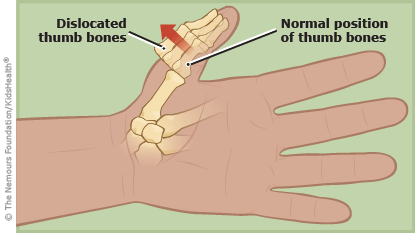- Parents Home
- Para Padres
- A to Z Dictionary
- Allergy Center
- Asthma
- Cancer
- Diabetes
- Diseases & Conditions
- Doctors & Hospitals
- Emotions & Behavior
- First Aid & Safety
- Flu (Influenza)
- Food Allergies
- General Health
- Growth & Development
- Heart Health & Conditions
- Homework Help Center
- Infections
- Newborn Care
- Nutrition & Fitness
- Play & Learn
- Pregnancy Center
- Preventing Premature Birth
- Q&A
- School & Family Life
- Sports Medicine
- Teens Home
- Para Adolescentes
- Asthma
- Be Your Best Self
- Body & Skin Care
- Cancer
- Diabetes
- Diseases & Conditions
- Drugs & Alcohol
- Flu (Influenza)
- Homework Help
- Infections
- Managing Your Weight
- Medical Care 101
- Mental Health
- Nutrition & Fitness
- Q&A
- Safety & First Aid
- School, Jobs, & Friends
- Sexual Health
- Sports Medicine
- Stress & Coping
A to Z: Dislocation, Thumb
A dislocation is when the bones in a joint slip out of their normal position. A dislocated thumb may happen from a fall, blow, or sports injury, especially if the thumb is bent back or jammed.

More to Know
An X-ray is usually used to diagnose a dislocated thumb. The bones may move back into place on their own or a doctor may gently put the joint back with a quick maneuver called a reduction. In some cases, surgery is needed to repair the joint.
To keep the joint from dislocating again, a splint is put on the thumb (the splint might later be changed to a cast). The splint or cast is worn for a few weeks while the thumb heals. Also, a sling (sleeve to hold the arm up) may be fitted to help with swelling.
Keep in Mind
With proper treatment, most people who dislocate a thumb can gradually return to their normal activities. The thumb may feel sore or stiff for a while.
All A to Z dictionary entries are regularly reviewed by KidsHealth medical experts.

© 1995- The Nemours Foundation. KidsHealth® is a registered trademark of The Nemours Foundation. All rights reserved.
Images sourced by The Nemours Foundation and Getty Images.
